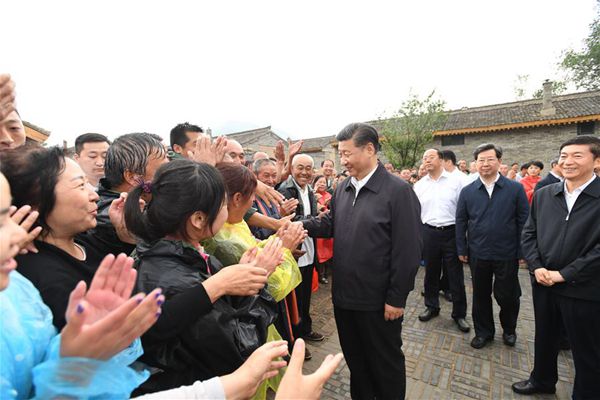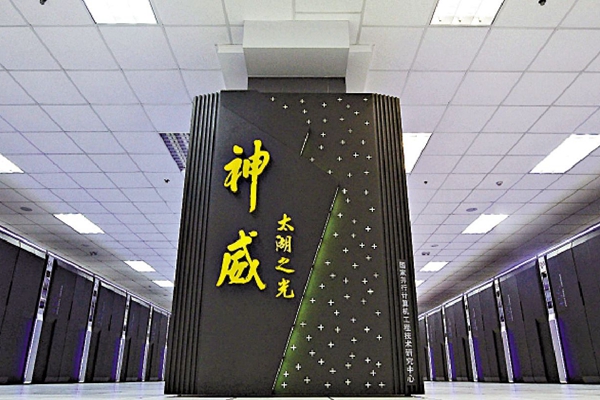Xi stresses reform, development, stability during inspection tour
|
|
|
Chinese President Xi Jinping meets with local villagers at Songjiagou New Village, a centralized resettlement site under the approach of alleviating poverty through relocation, in Kelan County of Xinzhou City, north China’s Shanxi Province, June 21, 2017. Xi had a three-day inspection tour in Shanxi from Wednesday. (Xinhua/Li Xueren) |
Chinese President Xi Jinping has urged all Party committees to advance reform, development and stability to create a sound environment for the upcoming 19th National Congress of the Communist Party of China (CPC).
Xi, also general secretary of the CPC Central Committee, made the remarks during an inspection tour in northern Shanxi Province, calling the congress a significant event for the Party and national political life.
During his inspection tour from Wednesday to Friday, Xi visited a revolutionary memorial museum, villages and enterprises in Shanxi Province.
At the revolutionary memorial museum in Xing County of Lyuliang city, Xi left a basket of flowers Wednesday morning to pay respect to the country’s war heroes.
The president said he was deeply moved after seeing pictures and old objects that reminded people of the old days of revolutionary struggle.
“Each part of the CPC’s revolutionary history is a vivid textbook of ideals and faith,” Xi said, urging Party members to forge ahead while staying true to the mission taken up by the CPC when it was founded in 1921.
He said that every Party member should remember the revolutionaries who devoted their lives to national independence and the people’s liberation, keep the mettle of the CPC members, be honest with the people, and create a better life for the people.
Xi met representatives of the old revolutionaries, spoke highly of their contribution and wished them good health.
On Wednesday afternoon, after over an hour’s drive, Xi visited three households in Zhaojiawa village in the destitute areas of Lyuliang Mountain region. He asked villagers the reasons for their poverty and the effects of anti-poverty measures.
After hearing that villager Liu Fuyou, his 71-year-old wife and 92-year-old mother were ill, Xi urged local officials to pay close attention to poverty caused by illness.
“In the past, I could not even dream that impoverished households could receive so much help from the Party and the government,” villager Cao Liuren told Xi.
“The Party and the government aim to serve the people, and it is our duty to let people live a better life,” Xi said.
Villager Wang Sannyu’s husband and son have passed away and her grandson and granddaughter are disabled. Xi urged local officials to arrange special education for her grandchildren.
To know drought-relief measures, Xi inspected a shallow well, the only water source for the village, as well as a cornfield. He also visited officials who were sent to help with poverty alleviation.
“It’s the Party’s solemn promise to let poverty-stricken people and areas enter a ‘moderately prosperous society’ along with the rest of the nation,” said Xi. He said efforts must be made to deliver on the promise no matter how arduous the process.
He called on poverty relief staff to stay humble, improve their abilities and realize their value by solving problems for the poor.
All the villagers came to see Xi off, applauding and cheering.
Xi visited Songjiagou New Village in Kelan county, where new houses have been built for people relocated from poor areas. Xi visited the home of impoverished villager Zhang Guiming, chatting with him about subsidies for resettlement as well as his new life and current troubles.
Xi said a major issue was to solve abject poverty. He said resettlement projects must respect the people’s will, taking relocation sites, investment, income, environmental protection and village management into consideration.
The president called on the villagers to “roll up sleeves and work harder together with the CPC Central Committee.”
Xi stressed technological innovation while visiting a rail transit equipment producer and a carbon materials company Thursday.
He inspected innovations in equipment manufacturing, electronic information, energy conservation and environmental protection, as well new materials and the coal chemical industry.
“Enterprises should play a major role in promoting industrial upgrading which is market-oriented. Breakthroughs should be made in technological transformation and innovation,” he said.
He called on the rail transit equipment company to grasp the opportunities of China’s transport development and the building of the Belt and Road to promote technological innovation and brand building.
“The creativity of enterprises, research institutes and researchers should be mobilized,” said Xi while inspecting the carbon materials company, adding they should get both a sense of achievement in innovation as well a sense of gains from the transformation of their achievements.
After hearing reports of Shanxi provincial officials, Xi praised their achievements in social and economic development, calling on local authorities and people to be bold in reform and innovation, and in tackling challenges.
Xi asked local authorities to enhance economic transformation by creating a good business environment and deepening supply-side structural reform.
Stating that issues of farmers, agriculture and the countryside are key priorities of the whole Party, Xi urged speeding up agricultural modernization and raising income of farmers via means ranging from better training to better basic public services.
Xi called for more efforts to improve people’s livelihoods by offering them better education and healthcare services.
Xi stressed green development, saying that stronger measures should be taken in economic transformation, environmental pollution control, ecological protection and restoration, as well as resource saving.
He called for strict intra-Party life, asking all Party organizations and Party members to follow rules on intra-Party political life and observe regulations and discipline.
“Officials who are both clean and willing to work deserve more opportunities of development,” Xi said.

